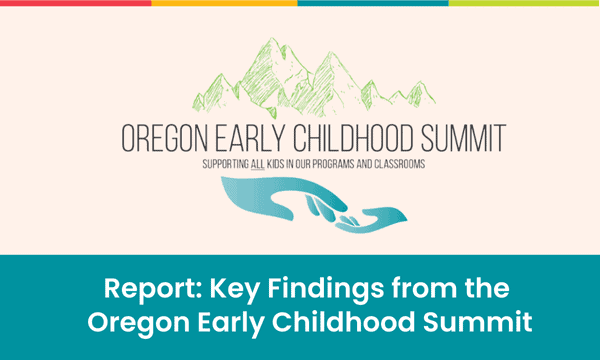This year, Children’s Institute and Trauma Informed Oregon (TIO) co-hosted the Oregon Early Childhood Summit. This event brought together cross-sector partners from early childhood, health and behavioral health, education and special education, advocacy, and philanthropy to build a shared vision and plan for early childhood social-emotional health, and to ensure all children are included in education and care.
We know that early childhood experiences set a foundation for a lifetime of well-being and success. That’s why it is critically important to prioritize social-emotional health during the earliest years of a child’s life. With this in mind, the summit focused on exploring strategies for enhancing social-emotional support for children and families.
The summit also aimed to unearth effective practices, innovative ideas, and systemic changes needed to ensure that all children have the opportunity to thrive.
Following this event, Children’s Institute and TIO produced a social-emotional health report, informed by focused sessions and conversations from participants who attended the gathering.
Oregon Early Childhood Summit Report
Key Findings
Vision for Children’s Social and Emotional Health
- Attendees shared a comprehensive vision for promoting children’s social-emotional health, rooted in child-centered care, community support, social-emotional learning, equity, inclusion, and trauma-informed care.
- This holistic vision emphasizes the importance of creating environments where children feel safe, supported, and empowered to express themselves authentically.
- By prioritizing the well-being of children and families, stakeholders envision a future where every child has the opportunity to reach their full potential.
What is Working for Children and Families?
- Transparent communication, cultural responsiveness, community collaboration, equity initiatives, trauma-informed care, and family-centered approaches emerged as effective strategies for supporting children and families.
- Participants highlighted successful programs and initiatives that foster trust, partnership, and family empowerment.
- By leveraging community strengths and centering families’ voices and experiences, stakeholders identified promising practices for promoting social-emotional health and resilience.
Untried Ideas, Changes in Policy or Practices
- Proposed solutions included advocating for equity and access, enhancing community engagement, investing in professional development, driving systemic change, implementing trauma-informed care, and empowering families.
- Stakeholders explored innovative approaches to address systemic barriers and promote the well-being of children and families.
- By challenging the status quo and embracing new ideas, attendees identified opportunities for transformative change in early childhood systems and practices.
Actions to Move Forward
- Participants called for increased funding, collaboration, equity initiatives, professional development opportunities, policy reform, family engagement efforts, and systemic change.
- These actions reflect a shared commitment to building more inclusive, supportive early childhood systems that prioritize the needs of children and families.
- By advocating for bold action and mobilizing resources, stakeholders aim to create lasting impact and positive change in early childhood care and education.

